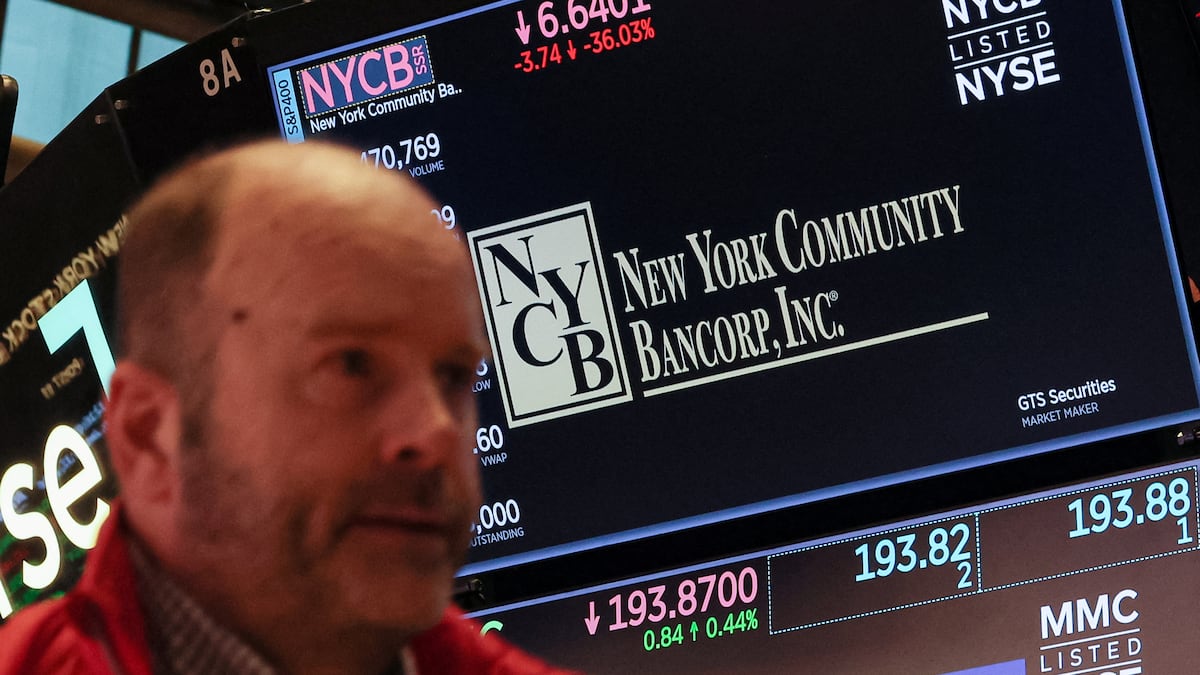A screen on the floor of the New York Stock Exchange shows the collapse of New York Community Bancorp on the Stock Exchange this Wednesday. BRENDAN MCDERMID (REUTERS)
Financial turbulence reappears.
The Federal Reserve decided a few weeks ago not to extend some of the emergency liquidity lines it launched last year because it believed they were not necessary and some entities were taking advantage of them to do business.
However, when the financial outlook seemed clear, New York City Bancorp (NYCB) plummeted on the stock market this Wednesday after publishing results.
Its fall has been 37.67% and has dragged down some other regional banks.
The question is whether this is an isolated case or whether it opens the way to another episode of financial instability.
Silicon Valley Bank, Signature Bank and First Republic Bank fell last year because of their debt investments, which lost value as interest rates rose.
It was a problem that affected many more entities and that is why there was at times a systemic risk.
In the case of New York Community Bancorp, the trigger for its entry into losses is the commercial real estate sector.
Again, there are many banks that have relevant exposure to that segment of the market.
In the small banking crisis of 2023, NYCB shares sank to lows of $6.40 due to contagion from Silicon Valley Bank, Signature Bank and First Republic Bank.
When the situation stabilized, the entity recovered strongly and seemed one of the winning regional banks of that crisis.
He managed to keep some assets of Signature Bank in advantageous conditions.
Through its subsidiary Flagstar Bank, it agreed to assume $38 billion of the bank's assets, including $25 billion in cash and about $13 billion in loans, from the Federal Deposit Insurance Corporation (FDIC).
The price of its shares more than doubled, reaching around $14 per share at the end of July, although in recent months it had lost ground.
This Wednesday, however, it sank 38%, closing at $6.47 per share, but the drop became greater during the session, to a minimum of $5.58 per share, which is also the lowest in more than two decades.
The nervousness about the market's reaction to its results has been such that the bank has twice filed additional information with the Securities and Exchange Commission (the SEC).
In the morning, before the market opened, the entity had actually reported that its annual profits had skyrocketed, from 617 million in 2022, to 2,341 million in 2023. However, these results included an accounting item of about $2.2 billion negative goodwill from Signature Bank asset purchase
Adjusted for that item and other merger-related items arising from both the Flagstar acquisition and the Signature transaction, as well as the FDIC's special levy to finance the redemptions, 2023 net income was $609. million dollars, 4% less than the previous year.
Additionally, in the latest quarter, the bank posted a loss of $252 million, compared to a net profit of $207 million in the three months ended September 30, 2023. Those losses included the impact of a higher provision for credit losses due to late payment.
“During the fourth quarter we have taken decisive steps to raise capital, bolster our balance sheet, strengthen our risk management processes and better align ourselves with our banking counterparts.
“We significantly increased our reserve levels, recording a provision for bad debts of $552 million, bringing our provision coverage more in line with that of these peer banks,” President and CEO Thomas Cangemi said in a statement.
“In addition, we have increased balance sheet liquidity as we prepare for strengthened prudential standards that apply to banks with $100 billion or more in total assets,” he added.
These provisions have surprised analysts and investors.
Late last year, investors were trying to gauge the possible consequences for U.S. banks holding some $2.7 trillion in commercial real estate loans, as property values plummeted and borrowers, desperate for new financing, they faced higher interest rates.
The provision for loans was more than 10 times higher than analysts estimated, and larger than the company's total provisions in the previous decade, according to Bloomberg.
The alarms have finished ringing with another measure announced simultaneously: the reduction of the dividend.
“We are creating capital by reducing our quarterly ordinary dividend to $0.05 per common share [from $0.17 previously].
We recognize the importance and impact of the dividend reduction on all of our shareholders and have not taken it lightly.
We believe it is a prudent decision, since it will allow us to accelerate the creation of capital to support our balance sheet as a category IV bank”, that is, with more than 100,000 million in assets, Cangemi explained.
The explanations have not convinced investors.
The bank corrected its presentation to include an estimate of the interest margin it expects to achieve this year, but even so the market has remained distrustful.
The next few days will be key in the evolution of the entity.
If it manages to stop any outflow of deposits and regain stability, it will be able to turn the page.
If market and depositor pressure intensifies, its viability will be at stake.
Follow all the information on
Economy
and
Business
on
and
X
, or in our
weekly newsletter

